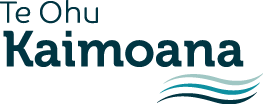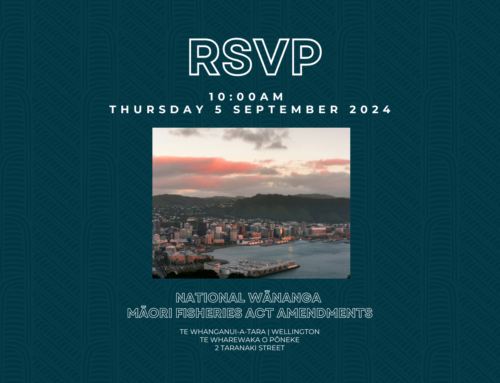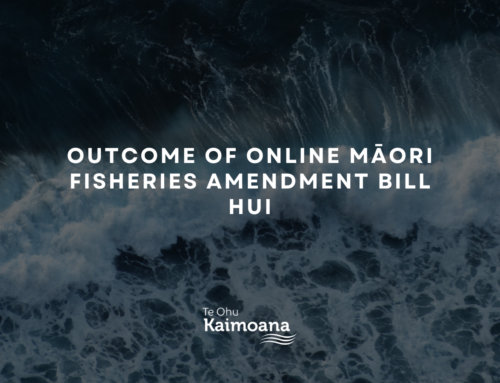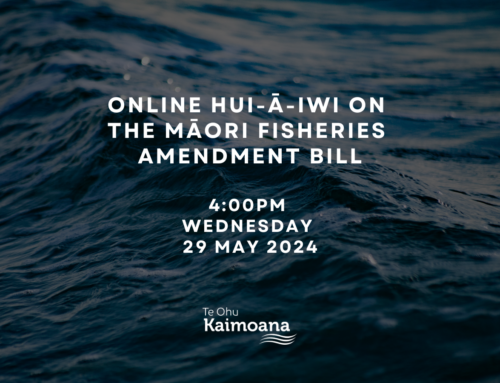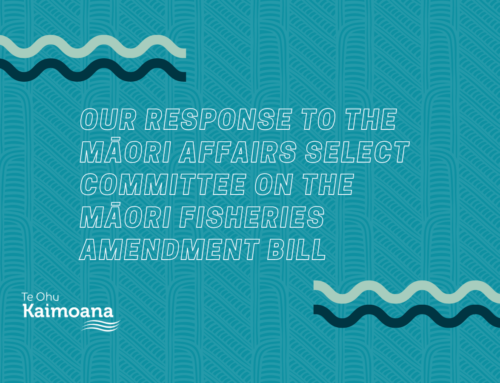Update on Māori Fisheries Amendment Bill – Key Points

This pānui provides you with an update on Te Ohu Kaimoana’s response to the Māori Fisheries Amendment Bill. In our last pānui, which can be found here, we provided an update on the Bill and information to support iwi in preparation for engagement with the Māori Affairs Select Committee.
Te Ohu Kaimoana’s response to the Select Committee
Te Ohu Kaimoana will be providing a response on the MFA Bill to the Select Committee, and we want to encourage all iwi to actively participate in this process. Our response will be drafted and finalised alongside iwi. We have been working to a short and focused timeline to produce this response:
17 March – We are circulating key points of our response to iwi.
20 – 24 March – A draft response will be drafted and circulated for feedback.
27 – 31 March: Te Ohu Kaimoana will be in touch with iwi individually for feedback and comments on the content and position of the draft response.
27 – 31 March: Concurrently with the above step, Te Ohu will be scheduling online hui for iwi to attend virtually and provide feedback or to simply discuss considerations of the Bill. These online hui are tentatively scheduled for:
- 10 am Wednesday, 29 March 2023
- 10:30 am Thursday, 30 March 2023
3 – 6 April: Te Ohu will be incorporating feedback from iwi and completing an internal review with an aim for lodging the response at the end of this week.
6 April: Submitting Te Ohu’s response to the Select Committee and sharing final copy with iwi.
We are now able to circulate the key points to iwi.
Key points of our response to the Select Committee
Our response to the Māori Affairs Select Committee on the MFA Bill will be structured in 3 parts:
- First, we discuss the historical context that led to the MFA Amendment Bill. This began with the statutory review in 2015, and lead to 12 resolutions being passed by Iwi that were presented to the Minister in 2016 and 2017.
- We then provide an assessment on whether the proposed amendments in the MFA Amendment Bill successfully implement the 12 resolutions of Iwi, and whether we consider further amendments are required to successfully implement iwi resolutions.
- Lastly, we provide comment on other proposed amendments in the MFA Amendment Bill that are not related to an Iwi resolution.
This next section will describe part II and III. We haven’t included Part I (the historical account), but we will welcome feedback on this part once the draft response is circulated to iwi.
Part II Amendments proposed by iwi
For ease, this part will be in order of the resolutions that were passed by iwi and presented to the Crown by Te Ohu Kaimoana.
Resolution: Te Ohu Kaimoana governance framework restructured
- The resolution relating to Te Ohu Kaimoana governance framework restructure that removes Te Kāwai Taumata as the system for appointing Te Ohu Kaimoana Directors and is replaced with Directors being appointed and removed on a one vote per iwi basis has been implemented into the MFA Bill. We understand this amendment reflects an intention to enable Iwi to have direct control over the appointment and removal process. This amendment will remove the ability for any Recognised Māori Organisation to have a role in the composition of the Board for Te Ohu Kaimoana, which they currently have through Te Kāwai Taumata.
- We also acknowledge that in 2017, Iwi agreed to an additional resolution about an alternative appointing body to appoint directors to Te Pūtea Whakatupu. As this resolution may result in legislative amendment, it was decided it should be readdressed in the next Māori Fisheries review. This resolution was passed unanimously and recorded in the 2017 Second Report to the Minister.
Resolution: That iwi hold all AFL voting and income shares
- Voting and income shares in Aotearoa Fisheries Limited (AFL), will be distributed to the Asset Holding Companies (AHCs) of Mandated Iwi Organisations (MIOs) in proportion to the total number of income shares they currently hold. We consider most of the statutory amendments required to implement this resolution have been incorporated into the MFA Bill. We will provide minor drafting feedback in relation to the implementing this resolution.
Resolution: That any surplus funds be distributed to iwi on an equal basis
- The MFA Bill proposes that Te Ohu Kaimoana’s surplus funds will be distributed to iwi proportionate to iwi population, based on a ministerial decision. This does not reflect what was passed by iwi by majority, which was for surplus funds of Te Ohu Kaimoana to be distributed to iwi on an equal basis.
Resolution: That the Māori Fisheries Act 2004 is amended to include a compulsory levy model, should iwi decide that this is the best on-going funding option
- Iwi agreed to create the ability for a levy to be raised should the functions of Te Ohu increase through the iwi approved strategic plans. We consider most of the statutory amendments required to implement the resolution that will enable iwi or Te Ohu Kaimoana to implement an annual levy for Te Ohu Kaimoana have been incorporated into the MFA Bill. Again, we have raised minor drafting feedback in relation to implementing this resolution.
Resolution: That the current legislative dividend requirement be removed from the Māori Fisheries Act, so as to allow shareholders to set the dividend policy
- The amendments to implement the resolution of Iwi to remove the AFL legislative dividend requirement and allow shareholders to set it annually have been incorporated into the MFA Bill. However, AFL will never be able to pay out a dividend for the year until the AGM the following March. Iwi may wish to consider whether they would endorse a process that allows shareholders to set the dividend in advance of the AGM.
Resolution: that special resolutions for major transactions for AFL require at least a 75% majority voting threshold
- The resolution that proposes a 75% majority iwi voting threshold, be set up for major changes to business activities in AFL, have been incorporated into the MFA Bill.
Resolution: that Te Pūtea Whakatupu Trustee Ltd continue with its directors increased to a maximum of 5 with a quorum of a majority of directors
Resolution: that Te Wai Māori Trust/Te Wai Māori Trustee Ltd continue with its directors increased to a maximum of 5 with a quorum of a majority of directors
- Directors for Te Wai Māori and Te Pūtea Whakatupu Trust are increased from 3 to 5 with a majority quorum. Further, the appointment term of directors with change from a maximum of four years to three years with a removal on restrictions on the number of terms a director can serve. We consider most of the statutory amendments required to implement this resolution have been incorporated into the MFA Bill. However, we will be seeking iwi feedback regarding the point of quorum potentially being as few as 2 Directors, and the removal on the restrictions on appointment of Directors.
Resolution: That the disposal restrictions in the Māori Fisheries Act 2004 for settlement quota and income shares remain and that simpler trading processes are developed for iwi wishing to sell some of their assets to willing buyers within the iwi/Te Ohu Kai Moana Group pool
- In line with the Iwi resolution new trading processes are developed for iwi wishing to sell settlement (quota) assets to a willing buyer within the Māori pool, without the approval of 75% of adult iwi members. This has been reflected and processes will be developed through the implementation phase. The sale of Settlement assets will still be bound by individual iwi Trust Deed processes.
Resolution: That a further review of settlement entities occur no later than 10 years from the date that the amended structural relationship arising from this review are in place to assess their scope, role, funding and governance arrangements including their individual continuance and/or retention of assets.
- Iwi resolved a future review of the settlement entities should not take place sooner than 7 years, but not later than 10 years from the time the current resolutions take effect. We consider the statutory amendments required to implement this resolution have been incorporated into the MFA Bill. However, the operational effect of the proposed amendments is that a review will only occur if there is a special resolution passed by Iwi to undertake a review. We are interested if Iwi agree with this proposed amendment.
Resolution: the Māori Fisheries Act 2004 and the TOKM Trust Deed be amended to also allow distributions, as directed by each MIO, to any charitable entity and/or for any charitable purpose (not just to a MIO or for fishing related purposes), within each MIO group structure to receive distributions
- Changes will be made to enable Te Ohu Kaimoana to distribute funds directly to charitable entities within a MIO or PSGE structure without being liable for tax. We consider the amendments required to implement this change have been incorporated into the MFA Bill. As this was one of the key topics raised by the Deputy Chairperson of the Māori Affairs Select Committee during the first reading of the Bill, we are interested in iwi feedback on this.
Resolution: That iwi hold all AFL voting and income shares
- We consider the amendments in the MFA Bill which will see Te Ohu Kaimoana’s redeemable preference shares in AFL be converted into income shares, which are then converted to ordinary shares to be distributed to iwi, incorporated in the MFA Bill. This will require an implementation phase that we know will be within 6 months, and we are interested in whether Iwi have any thoughts on this amendment in practice (including tax implications).
Part III – Other proposed amendments in the MFA that were not proposed by iwi resolution
Amendments to section 167
- Proposed section 167 of the MFA Bill is related to the amendment which will enable iwi to sell their settlement assets to a willing buyer within the Māori pool.
- Section 167 amends the definition of “third party” as it relates to this section. This would see the Crown excluded from the definition of “third party”, meaning the restrictions on third parties buying settlement quota would no longer apply to the Crown. This would mean the Crown has the potential to acquire settlement assets (quota) through exercising its rights under options, mortgages, other security interests, and guarantees. This provides the Crown with a legislative process to reduce the settlement quota.
RIOs to receive draft annual plan
Recognised Iwi Organisations (RIO) do not receive copies of Te Ohu’s draft annual plan, but MIOs will receive this. However, RIOs will have the right to approve the new strategic plan (section 36A(3)(b)), and when reporting on the annual plan and strategic plan, Te Ohu will need to report to RIOs (as per the new section 23(2). We consider that RIOs should receive copies of Te Ohu’s draft annual plan.
Next steps
Iwi can anticipate to receive the draft version of our response next week. Iwi will have until 3 April 2023 to provide us feedback. There will also be an opportunity to provide feedback at online webinars later this month.
We also welcome the opportunity to discuss this draft kanohi ki te kanohi, should iwi prefer.
If you would like to discuss this kaupapa directly with Te Ohu Kaimahi, you are welcome to contact Brianna Boxall at brianna.boxall@teohu.maori.nz.
